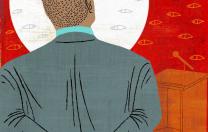Despite remarkable advances in the treatment of mild mood and anxiety disorders in recent years, many people with severe depression do not find relief. An estimated 16 percent of Americans suffer from some form of major depressive illness at some point in their lifetimes. The primary symptoms include a profoundly depressed mood for at least two weeks, markedly diminished interest in daily activities, significant disruption of appetite and sleep, visible psychomotor problems, an inability to concentrate, and feelings of worthlessness. “In its most serious form, major depressive disorder impairs a person’s ability to act as [his] own agent, to function in [her] life relationships and work,” explains Alexander Vuckovic, assistant clinical professor of psychiatry and medical director of The Pavilion at McLean Hospital. About half of the people who get the disorder fall into this acute and potentially deadly category. According to the most recent edition of psychiatry’s Diagnostic and Statistical Manual, 15 percent of people with severe major depressive disorder die by suicide. “That’s 30,000 deaths a year,” Vuckovic points out; depression is the third-greatest killer of young Americans, after automobile accidents and AIDS.
|
Major depression strikes people across the sociodemographic spectrum, but recovery rates vary considerably from individual to individual. A recent nationwide study, funded by the National Institute of Mental Health, determined that 70 percent of patients with major depression do not experience complete remission of symptoms after initial treatment with a selective serotonin reuptake inhibitor (SSRI). Researchers found that a good antidepressant response correlated with being well educated, employed, married, white, and female, with few complicating problems; factors such as co-occurring anxiety, substance abuse or physical disorders, and poverty contributed to a poor response. The six-year study, known as STAR*D (Sequenced Treatment Alternatives to Relieve Depression) aimed to determine the effectiveness of standard treatment protocols and to develop systematic methods for identifying which drug (and non-drug) therapies work for which patients. Preliminary results showed that enlisting patient participation in their own treatmentthrough the use of self-assessment scales for depressive symptoms and medication side-effectsincreased the rate of full recovery for chronic patients.
Evidence suggests that prompt alleviation of depression may significantly benefit a patient’s long-term quality of life. Left untreated, depression can inflict a serious physical toll. According to associate professor of psychiatry Gregory Fricchione, associate chief of psychiatry at Massachusetts General Hospital (MGH), major depressive illness doubles a person’s risk of heart disease. “There’s an unholy alliance between depression and coronary artery disease,” he says. “If you have a heart attack, you are at a higher risk for depression, and serious depression in turn increases your risk of subsequent heart attacks.” Fricchione addresses this dangerous interplay in a new book, The Heart-Mind Connection, coauthored with Windsor Ting.
Recurrent major depressive episodes may also lead to residual neurological impairments, according to recent studies cited by professor of psychiatry Maurizio Fava, associate chief of psychiatry for clinical research and director of the Depression Clinical and Research Program at MGH. “Some researchers believe that the duration of depressive symptoms may contribute to the presence of cognitive symptoms that may not abate despite effective antidepressant treatment,” wrote Fava in 2003 in the Journal of Clinical Psychiatry. One recent study found that depressed patients who’d suffered multiple depressive bouts had reductions in the brain’s hippocampal volume, which correlated with poor performance on memory tests.
Depression’s impact on individuals is cumulative. “There’s a long-term price to pay for leaving depression untreated,” Fricchione says. “There’s a risk of dysthymic disorder, which means the sufferer will have chronic lower-than-normal mood. With each episode [of depression], it becomes increasingly difficult to get back to baseline well-being.”







